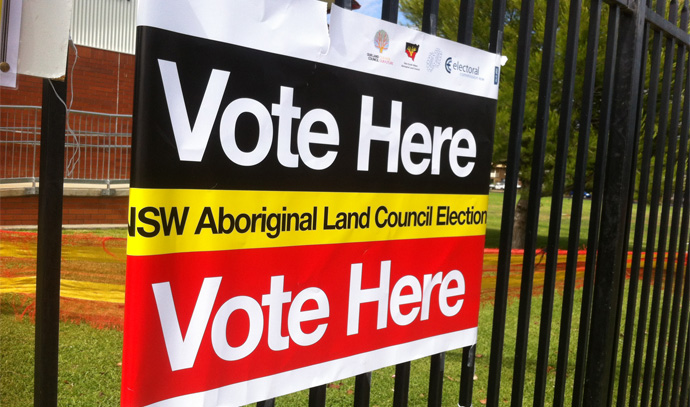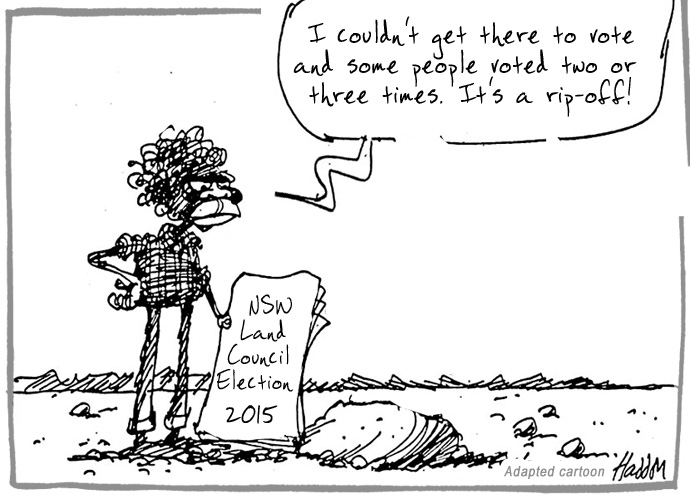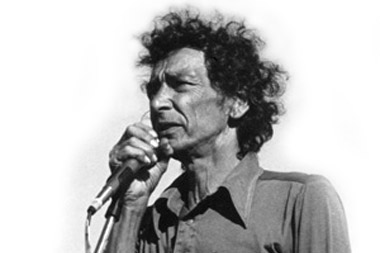Call for information on NSW Land Council election irregularities


8 November 2015
Ghillar Michael Anderson
Ghillar Michael Anderson, Convenor of the Sovereign Union, co-founder of the Aboriginal Embassy and Head of State of the Euahlayi Peoples Republic, said from his Home near Goodooga today that his recent participation in the NSW Aboriginal Land Council election process was indeed an absolute eye opener. The experience demonstrates a number of major flaws in the process and encourages and indeed provides a recipe for absolute corrupt activities which enable people to stay in power.
I would like to address these issues in this statement in order for people to understand the challenge.
The lessons learnt are summarised by Feli McHughes of Brewarrina who said: 'The NSW Aboriginal Land Council system is a broken system.'
37 000 land claims in NSW have not been processed by the government and now Local Land Councils are being approached to accept the finalisation of a few claims and to forfeit the rest.
We need to address the failings before its too late as the NSW government can now assert two things. One, the NSW Aboriginal Land Council Councillors, by virtue of them being elected, may choose to argue that they have been given a mandate to make decisions for Aboriginal Peoples in NSW under State law and within the State jurisdiction. But when we look at the overall statistics of the NSW Aboriginal population in relation to the Land Council elections the actual votes for the Regional Councillors fall so far short that they cannot even argue they represent a minority. In fact, if we are to do the sums on this election the votes are so few that the mandate they talk of to represent the Land Council members are so minuscule that the alleged mandate cannot be accepted as valid.
It is said that there are approximately 24 000 registered members of the NSW Land Council system in NSW compared with the 2011 Bureau of Census and Statistics figures for NSW which records the total Aboriginal population as 198 920. Out of the registered Land Council members not all are voting members because to qualify to vote in the elections a member has to attend a specified number of Local Land Council meetings each year. The NSW Aboriginal Land Council website shows that a total of 4444 members voted on 31 October 2015 which is approximately 2.2% of the total Aboriginal population in NSW. This means means only 4.4% of the adult Aboriginal population in NSW voted, if we estimate that half the fast growing population is under 18.

For the NSW Aboriginal Land Council to claim it has a mandate to make decisions on land and other matters is a fraud against the people. Moreover, the majority of Aboriginal Peoples in NSW have never supported the Land Council process from the beginning because of its limitations.
Having participated in the NSW Aboriginal Land Council election process I have learnt the following:
- In some cases past members of the NSW Aboriginal Land Council deliberately nominate a candidate to draw away numbers from potential threats to sitting members, despite living outside the region they are standing for.
- There is no absentee voting available for people who live outside of their regions but chose to be voting members in the town or locality from where they come.
- The voting process is manual, that is each polling booth has a list of registered members for each individual region and when people come to vote their names are marked off. If, however, you are in driving distance of three or four other locations in your region people can travel all day from one polling to another, voting more than once for the one candidate. Because the counting is done manually the only way this can be checked off is when an audit is done of every polling booth where people have cast their votes.
- I have received information that deceased persons names were used during the election where those names had not yet been removed from the voting membership roll.
-
Aboriginal people have been turned away from polling places in various places because their names are no longer on the membership roll despite having voted in the 2011 NSW Aboriginal Land Council election. I am aware of only one person who was allowed a 'contested vote' process. Other potential voters were turned away and never offered this right. We need to establish a register of how many people were actually turned away on the voting day and other irregularities. In this regard people can contact the Sovereign Union Facebook message system and tell your story.
The strict rules in the NSW Land Rights Act 1983 as amended, requiring people to attend a specified number of meetings in order to qualify as a voting member, violate Human Rights and freedoms. What is worse the Land Rights Act provides for the removal from the Local Aboriginal Land Council (LALC) membership roll of members, who may fail for one reason or another to attend two meetings in a year. This is a denial of human freedoms and Human Rights. Australia is the only country in world where Human Rights come with caveats and conditions. -
The NSW Electoral Commission is responsible for running these elections and was engaged by NSW Aboriginal Land Council to conduct the election, so the responsibilities for the election process falls on NSW Land Rights Act which designs the process. It is alleged that the NSW Electoral Commission charged the NSWAboriginal Land Council $1.2M to run this election and the previous election cost $500 000. It is suggested that the spike in cost is due to not enough polling booths being placed throughout NSW in the previous election.
I have received many calls from NSW complaining about the process from both the voters and candidates, who express grave concerns about the validity of the process. We also have to remember that prisoners cannot vote. I have looked at the NSW Land Rights Act 1983 as amended, particularly with regards to the methodology for contesting an election process and outcome. To my shock and horror the dispute process is described in the following terms under the NSW Land Rights Act 1983 as amended:
(1) The procedure of the Court on an application under section 125 is to be determined by rules of Court, or in the absence of rules of Court, by the Court or a Judge of the Court.
(2) The Court is not bound by the rules or practice of evidence and can inform itself on any matter in such manner as it considers appropriate. (emphasis added)
(3) Despite section 125 (3), the Court may make an order for costs in respect of an application under section 125 only if the Court is satisfied that there are exceptional circumstances that warrant the making of such an order.
128 Decisions to be final
(1) A decision of the Court in respect of an application under section 125
is final and conclusive and without appeal, and is not to be questioned in
any way. (emphasis added)
(2) Section 58 of the Land and Environment Court Act 1979 does not apply
to any such decision of the Court.
The question now arises is which court do we go to or is it an especially convened court where the rules of evidence do not apply? To have no right of appeal is an absolute human rights abuse. The cost of running courts ensures that corruption continues because Aboriginal Peoples do not have sufficient financial reserves to pay for justice.
Furthermore, the powers granted to the Registrar under NSW Land Rights Act 1983 as amended create a dictatorship and the people have no right of appeal against his or her decision. This would not be tolerated in any other section of Australian society. The powers of the Registrar under NSWAboriginal Land Council is beyond belief and cannot remain in force as they violate many aspects of Human Rights.
Justice can never be done in this country for Aboriginal Peoples until there is a major social transformation, because it costs too much money to run court cases and 'the thief is the judge'. The thief who committed the original land theft now appoints the judges, whose only responsibility is to uphold the laws written by the thief himself.
.
Ghillar Michael Anderson
Convenor of Sovereign Union of First Nations and Peoples in Australia
and Head of State of the Euahlayi Peoples Republic
Mogila Station, Goodooga NSW 2838
ghillar29@gmail.com, 0427 292 492
www.sovereignunion.mobi

Kevin Gilbert 1933-1993
Aboriginal Activist, Artist, Writer & Poet
by Kevin Gilbert 1933-1993
Don't be like the rest of 'em bud
a big loose mouth or a pen
Who's gonna lead us… and lead ya must
to git us our right place again
we're sick of the pain and the snearin'
tired of bein' treated like dirt
we ain't fifth-raters – we're human
'cept they keep up the crippli' an' hurt…
say what is the word for us Blacks now
where are we goin' to turn
if you're like the rest Christ help us –
I replied
Men have died is less hope brother
LAND justice is our cause
don't tremble at the sound of drums
or cringe at thought of wars
stand yourself up fiercely
gather strength from all your grief
and terrorise injustice if you must
to cure the thief…
and we'll stand there beside you
our land will glow applause
the big mouths too will join and lead
and pens turn into swords
our women with their eyes aglow
their suckling babes at breast
will MARCH AND BURN AND BLEED AND WEEP
AND WIN before we rest.
(c) Kevin Gilbert 1933-1993
www.kevingilbert.com.au

